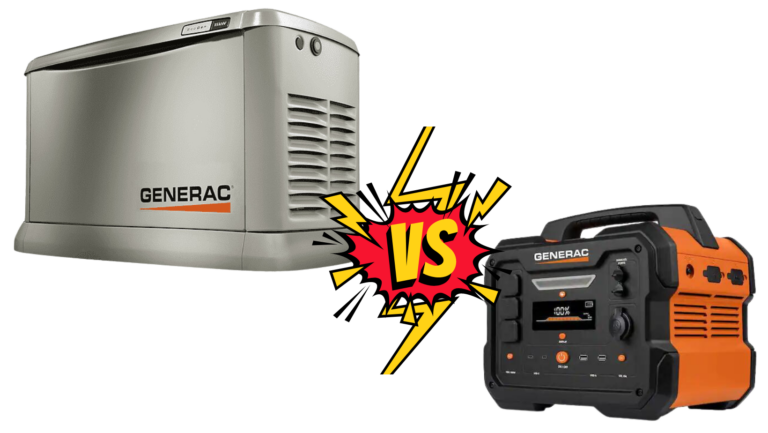

When the power goes out, whether due to a storm, equipment failure, or other issue, utility power and having a reliable backup power source becomes invaluable. There are four types of backup generators: standby generators, portable generators, inverter generators, and solar generators.
For residential customers, the two most common options for emergency power are Standby Generators and Portable Generators. However, which one is right for you?
This comprehensive breakdown will examine the pros and cons of standby and portable generators and why you might want to choose one.
Standby generators are permanently installed in your home, often known as fixed generators. During a power outage, they quickly activate by connecting to your gas line.
Portable generators are not permanently installed in your house. They are usually stored in garages or sheds and can be quickly accessed for emergency power supply.
One of the standout features of a standby generator is its automatic operation. Imagine this scenario: It’s midnight, and a storm knocks out the power in your neighborhood.
Portable generators require manual setup and switching of a power source during an outage, while standby generators automatically activate in response to power loss.
A standby generator is connected to an automatic transfer switch that monitors your home’s electrical supply. When a disruption is detected, the manual transfer switch only isolates your home from the grid.
It reroutes the electrical flow to originate from your generator—all within seconds and without any manual intervention. This feature provides unparalleled convenience, ensuring the transition virtually undisturbed of your daily activities or sleep.
A portable generator may suffice if you only need to power a few essential appliances, like a refrigerator and lights. However, what if you want your life to continue as usual during a power outage?
Standby generators provide high power output to meet the electrical demands of a whole household, including power-hungry appliances like air conditioning and heating, as well as luxuries like a home entertainment system.
Standby generators seamlessly integrate with your home’s electrical infrastructure, powering everything simultaneously. There is no need to choose between hot water, heating, fresh food and well-lit rooms.
You get to maintain your standard of living even during extended power outages.
Safety is an often underestimated but critical aspect to consider regarding generators. Standby models have a leg up cons portable generators in this department for several reasons.
Firstly, standby generators are professionally installed and grounded, reducing the risk of electrical hazards. Unlike portable generators, they do not require extension cords running through windows or doors, which can be both a trip hazard and a fire risk.
Secondly, standby generators are usually powered by liquid propane or natural gas, less flammable fuels than the gasoline used in most portable units. Plus, because they are directly connected to a fuel line, storing or manually handling fuel is unnecessary, eliminating the associated risks.
Standby generators offer optimized fuel efficiency and durability compared to portable generators. Not all portable generators are truly portable, with some weighing over 150 pounds and causing inconvenience.
Lastly, the enclosed nature of standby generators typically offers better protection against weather elements, further reducing the risk of electrical or fire hazards. So, portable vs. standby generator, which is right for you?
Portable generators are best suited for:

One of the most significant dangers of portable generators is the risk of carbon monoxide (CO) poisoning. Carbon monoxide is a colorless, odorless gas produced during the combustion process in your generator.
Portable generators are powered by gasoline, a highly flammable substance. Improper handling during refueling can result in fires while storing substantial amounts or large quantities of gasoline carries the risk of fuel leakage and fire hazards.
Portable generators pose a higher risk of electrical shocks or electrocution due to a lack of comprehensive safeguards. One common mistake is plugging them directly into a wall outlet, known as “backfeeding.”
For standby generators, professional installation is necessary. This involves:
At Generator Supercenter of Peabody, we are licensed professionals offering end-to-end solutions for standby generator installation. With our expertise, you can ensure that your generator is installed safely, efficiently, and in compliance with all local regulations.
To conclude, both standby and portable generators have pros and cons. Your choice should be based on your specific needs, budget, and how you prioritize convenience, power, and safety.
Feel free to consult with us at Generator Supercenter of Peabody to find the right solution.
Copyright © 2021 Generator Supercenter of Peabody
*Terms and Conditions apply to all financing offers and monthly terms. Click here for Financing Options.